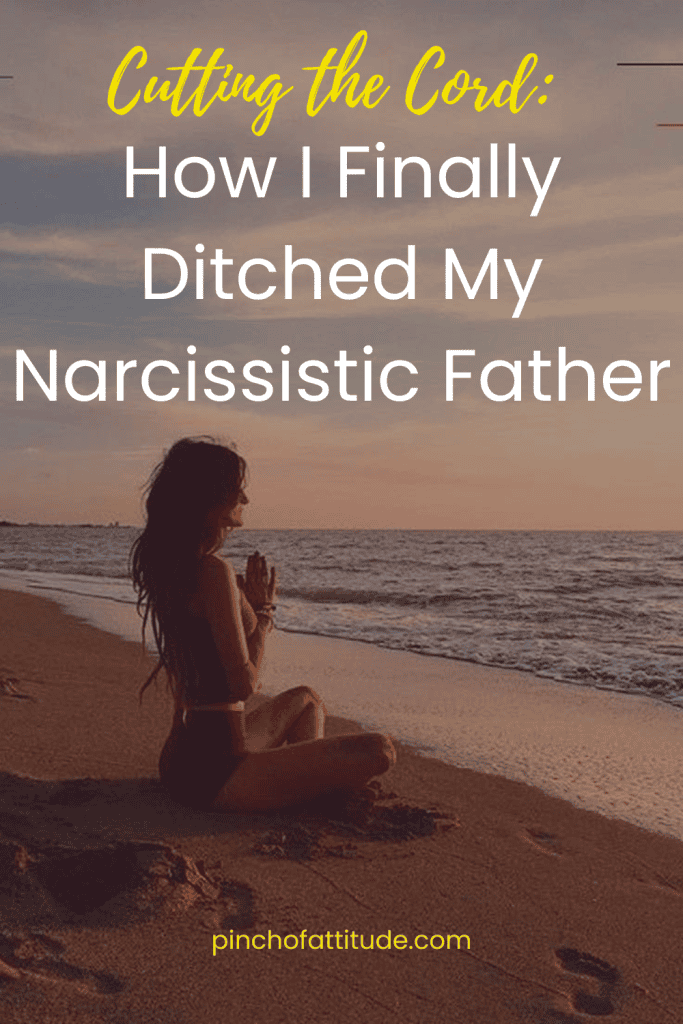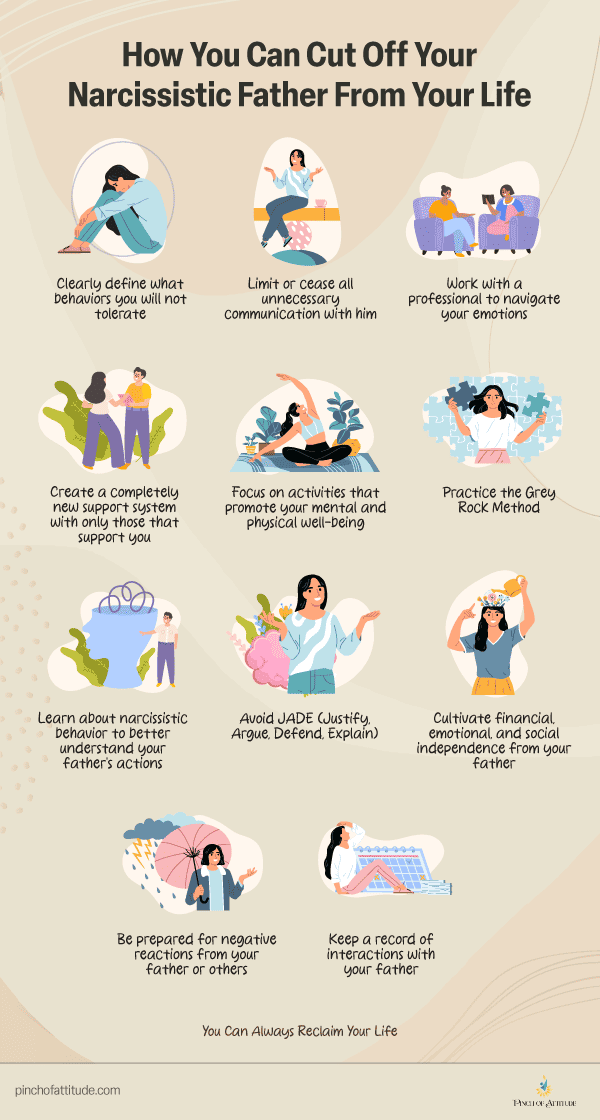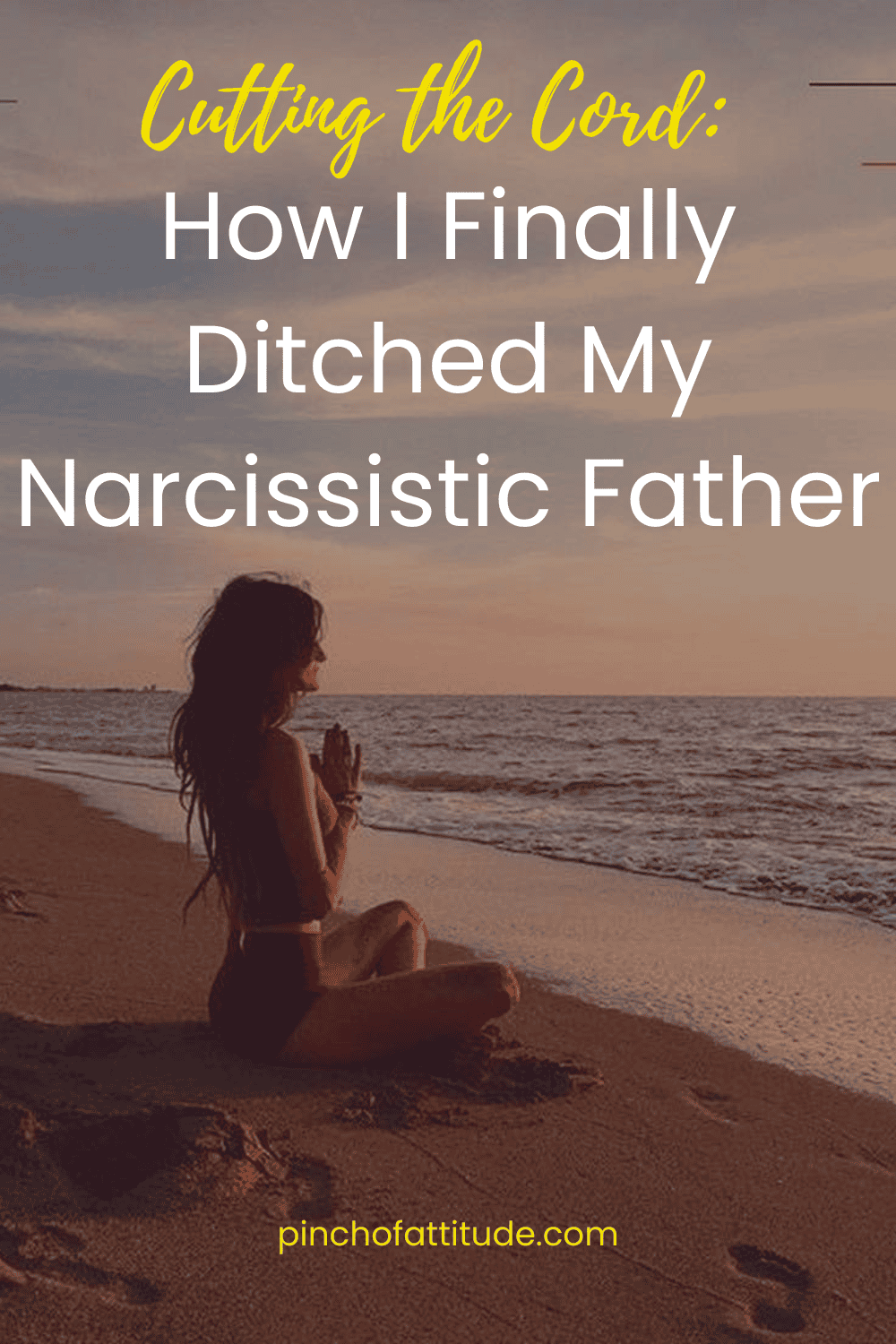Does your dad shower you with praise when you succeed, then snatch it back with a snide remark? Does he guilt-trip you with “you’re the only one who cares?”
Well, you’re not imagining things.
Growing up with a narcissistic mom myself, I learned that these are some of the not-so-subtle signs of a narcissistic parent.
But I finally got tired of her drama and decided to do something about it. I started setting boundaries and limiting contact.
Some may say that cutting off narcissistic fathers sounds too extreme, but sometimes, it is the only way to go for healing to take place.
If you’re ready, let’s talk about when things might be getting too toxic and how to step back without getting sucked back in by his passive-aggressive jabs.
It’s a tough road, sure, but you deserve a parent who cheers you on, not tears you down.
- Cutting off a narcissistic father can be tough, but it’s a brave step towards healing. You deserve a life free from manipulation and negativity.
- Healing is possible. The journey will have ups and downs, but with self-compassion, therapy, and a supportive network, you can emerge stronger.
- You’re not alone. Seek support from online communities, therapists, or friends who understand.
Table of Contents
When Should You Consider Cutting off Your Narcissistic Father?

Consider cutting off your narcissist dad when his actions consistently harm your well-being, and when your efforts to establish boundaries or seek understanding prove pointless.
Of course, there’s no one-size-fits-all answer as to when exactly that is. The best option depends entirely on your unique circumstances.
But if your father’s presence consistently:
- Undermines your self-esteem with belittlement, manipulation, or lies,
- Violates your boundaries and disregards your needs and feelings,
- Causes you stress through guilt trips, drama, or emotional abuse, and
- Endangers your physical safety through threats, violence, or neglect.
Then, seriously think whether maintaining contact, even limited, aligns with a life you deserve to live.
When I finally decided to go no contact with my narcissistic mother, that’s when I realized that prioritizing my well-being is not selfish.
Instead, it was necessary for my personal growth and for building a fulfilling life.
Tip
A toxic parent, even a biological one, is not obligated to hold space in your life if their presence and actions make you feel diminished, disrespected, or unsafe.
11 Tips on How You Can Cut off Your Narcissistic Father From Your Life

Cutting my mom off wasn’t easy, but it was the single most important thing I did for my sanity. And guess what? The steps I took worked.
Now that I’m in a much healthier place, I want to share those same tips with you.
You’ve already made the brave choice to prioritize your healing by deciding to put space between yourself and the source of your hurt.
Now, here are strategies you can do to disentangle from the toxicity:
1. Clearly Define What Behaviors You Will Not Tolerate
Draw the line, and don’t let him cross it. Every behavior that makes you feel small or manipulated gets a big X on your “Nope List.”
Is it the guilt trips disguised as “helpful” advice? Or the backhanded compliments that seem like insults dressed in velvet?
Maybe it’s the relentless need to insist you’re “wrong” even when the truth is staring him in the face. Whatever it is, own your boundaries.
Let him think he’s better than everyone. That’s not your burden to carry.
2. Limit or Cease All Unnecessary Communication With Him
You’ve drawn your boundaries, now build a soundproof wall. Limiting contact isn’t about playing tit-for-tat, it’s about protecting your peace.
Maybe calls get shorter, texts go unanswered, or you politely decline family dinners that leave you feeling like a side dish of guilt.
Remember, cutting off contact doesn’t have to be an all-or-nothing thing. Find the level that feels right for you.
You shouldn’t have to be uncomfortable to avoid an argument, and you definitely shouldn’t resort to emotional self-flagellation to appease his ego.
Tune him out, so you can tune into your inner peace.
3. Work With a Professional to Navigate Your Emotions
Dealing with a narcissistic father is an emotional rollercoaster.
It’s okay to feel all the feels – the anger, the sadness, the confusion. And if you’re tired of untangling the mess alone, seek therapy.
It isn’t about airing dirty laundry to a stranger. It’s about investing in your mental health.
Think of it as a personal trainer for your emotions.
They can help you build strength, set boundaries, and navigate those “he’d never do that, would he?” moments with someone who’s seen it all (and won’t judge).
4. Create a Completely New Support System With Only Those That Support You
When you cut off a narcissistic family member, it doesn’t mean you’re burning down the whole family tree. You’re not forgetting about them.
You’re just choosing to focus your love and energy on the ones who truly love you for you and not for the drama your dad brings.
Think of it like having a tribe with only your loved ones – a friend who always has your back, a partner who will hold your hand through the tough times, and maybe even a relative who celebrates your wins without strings attached.
5. Focus on Activities That Promote Your Mental and Physical Well-Being
I’ve seen the ugly effects of growing up with a narcissistic parent, and I realized that the best revenge is to nurture my mental and physical well-being.
I’d write in my journal, meditate, or take that long walk I’ve been putting off, and they’d work! It’s like saying, “I deserve to feel good, and I’ll create that feeling myself.”
So, ditch the “shoulds” and “shouldn’t haves” and date yourself.
Tip
Take that yoga class you’ve been eyeing and cook that healthy meal you’ve been craving. Self-care isn’t selfish. It’s the ultimate rebellion against his negativity.
6. Learn About Narcissistic Behavior to Better Understand Your Father’s Actions
Reading up on narcissistic personality disorder can be like cracking the code to their manipulation.
When I did this, I learned how my mom’s need for control, lack of empathy, and tendency to enable drama are textbook characteristics, not personal attacks.
It isn’t a free pass for her actions, but it shifted my perspective.
When you understand narcissism, you’ll be able to disarm it. It takes away your dad’s power to surprise you and twist your emotions.
7. Cultivate Financial, Emotional, and Social Independence From Your Father

Breaking free from a narcissistic father often means severing the ties that bind you, not just emotionally but also in other aspects.
You don’t need his approval or admiration to feel worthy.
So, find ways to stop being dependent on your father for anything, be it financially, emotionally, or socially.
He will just use these to manipulate you and control every aspect of your life.
8. Avoid JADE (Justify, Argue, Defend, Explain)
This is the narcissist parent’s favorite game and one you don’t want to play.
While I believe going no contact is the best route to take, it may not work for everyone. So, if you absolutely must communicate, keep it short, clear, and emotionless.
Say something like, “I don’t want to discuss this,” or “This behavior is unacceptable, and I won’t tolerate it.”
Tip
You don’t owe your dad explanations for your boundaries. Focus on your well-being and surround yourself with people who treat you with the respect you deserve.
9. Practice the Grey Rock Method
This technique is something I watched in a YouTube video years ago and is pretty straightforward. You just become as interesting as, well, a grey rock.
By showing zero emotion, giving short, neutral answers, and avoiding personal details, you take away his fuel.
He tries to bait you with a snide remark? “Mm-hmm.” Guilt trip about that time you borrowed his lawnmower? “Noted.” He asks about your love life? “Same old, same old.”
You’re basically a conversational black hole, sucking in his negativity without giving anything back.
10. Be Prepared for Negative Reactions From Your Father or Others
When I cut off my narcissistic mother, she threw tantrums and guilt trips and even tried to manipulate others to turn against me.
After all, they said, “Blood is thicker than water, right?” Well, sometimes, the chosen family is the strongest bond.
Family dynamics can be messy, and not everyone will understand your decision.
Prepare for some raised eyebrows, awkward conversations, and maybe a few flying feathers (metaphorically, of course).
But stay strong, remember your “why,” and surround yourself with people who celebrate your boundaries.
11. Keep a Record of Interactions With Your Father
Keeping a record of your interactions with your dad might sound like homework, but trust me, it can be a lifesaver.
Document the gaslighting, the manipulation, and the casual cruelty.
It’s not because you’re trying to win some game of “Who’s the bad guy?” (We already know the answer to that). It’s to protect your peace of mind.
He knows exactly what he’s doing, but having a record of the actual events can help you stay grounded in reality and avoid his gaslighting attempts.
So, how do you keep this record? It’s up to you! Bullet points in a notebook, voice recordings, and even just timestamped text messages can all be helpful.
What Can You Expect After Cutting Your Narcissistic Father Off?
Right after cutting off toxic family members, especially a narcissistic dad, you will experience a mix of relief and grief.
Over time, the toxic environment you escaped from can also leave a void, triggering feelings of sadness and loss.
Even then, remind yourself of the major steps you’ve taken toward reclaiming your well-being. It wasn’t easy to reach this point, so don’t give up now.
As for your father, his reactions may vary, ranging from anger and manipulation to guilt trips and even attempts to re-enter your life.
Stay firm in your boundaries and remember that healing takes time. Focus on building a supportive network and nurturing your emotional well-being.
With time and self-compassion, you can come out the other side stronger and build a life free from the shadow of your father’s toxicity.
Related Posts:
- Going No Contact With Your Elderly Narcissistic Father: 13 Tips For You
- Why Are You So Tired After Leaving a Narcissist?
- Why Grieving After Narcissist Abuse Is Quintessential?
- How to Heal From a Narcissistic Father: 11 Helpful Ways So You Can Start Right!
- Healing From the Emotional Scars of Cutting Ties With Narcissistic Family
Frequently Asked Questions
Is there a way to save your relationship with a narcissistic father?
It’s difficult to save a relationship with a narcissistic parent due to their ingrained patterns. However, if both are willing to put in the effort, it’s not entirely impossible.
How do you know if cutting ties is the right decision for your mental well-being?
Deciding to cut ties is a deeply personal choice. But if your well-being suffers, and no change is in sight, going no contact might be necessary for your mental well-being.
Should you inform your narcissistic father of your decision to cut ties, or is it better to do it without explanation?
Both approaches have potential implications, so evaluate what feels safest and most supportive for your well-being. Prioritizing your mental health should always come first.
What support systems are available for those who choose to cut ties with their narcissistic parent?
Many support systems exist for those cutting ties with a narcissistic parent. There are online communities and forums, therapists, support groups, and friends and family.
Is it possible to heal after cutting off your narcissistic father, and what does that process look like?
Healing after cutting ties with a narcissistic parent is not only possible, but it’s also a journey of reclaiming your life. Expect ups and downs, but embrace therapy, self-compassion, and a supportive network.




